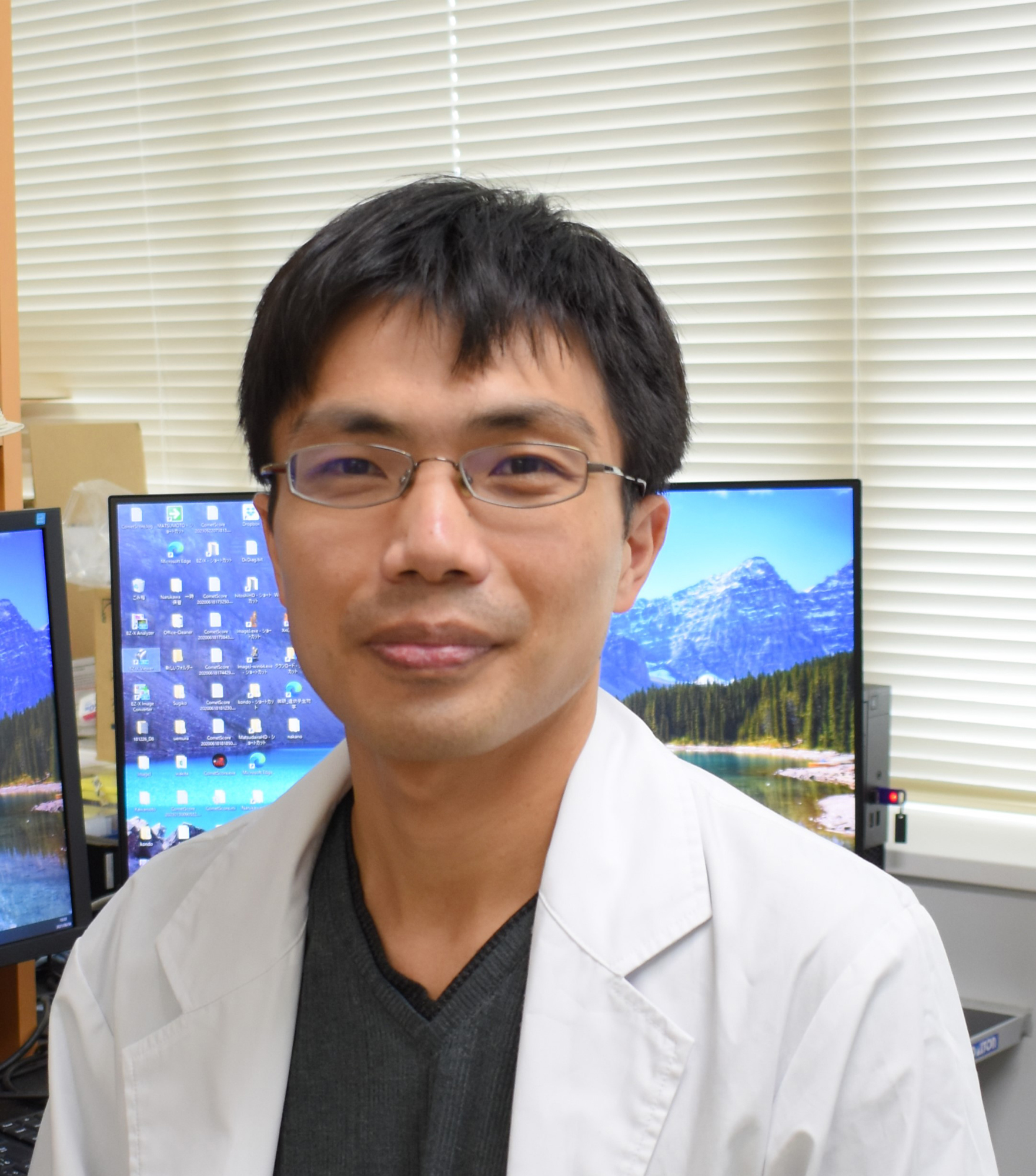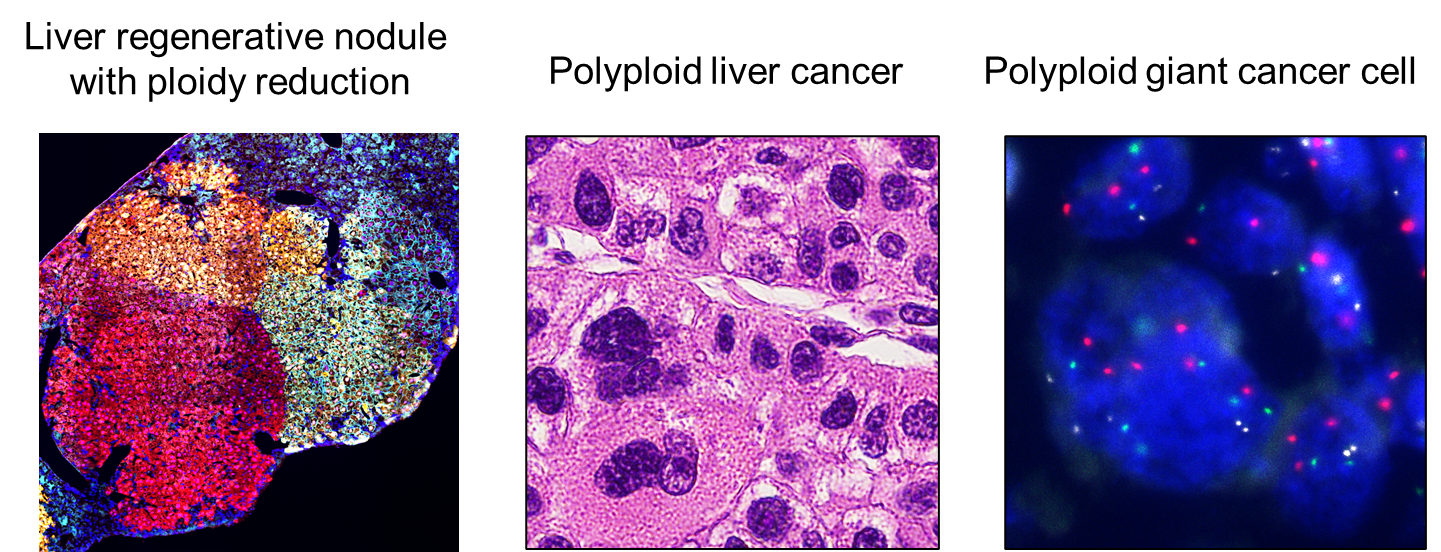Biomolecular Networks Laboratories
Laboratory of Ploidy Pathology
 Assoc. Prof. MATSUMOTO Tomonori
Assoc. Prof. MATSUMOTO Tomonori
Keywords:
Ploidy, Genome doubling, Polyploidization, Chromosomal instability, Cancer, Tissue damage
We aim to elucidate the mystery of ploidy to conquer cancer and diseases

(Left panel) Liver regenerative nodule in multicolor reporter mice that demonstrates ploidy reduction in somatic cells. (Middle) HE staining of polyploid liver cancer. (Right) Chromosome FISH of a polyploid giant cancer cell
Members
| MATSUMOTO Tomonori (Assoc.Prof.) | matsumoto.tomonori.fbs[at]osaka-u.ac.jp |
|---|---|
| KOBAYASHI Miki (Researcher) | |
| OCHI Sayuri (Secretary) |
- ※Change [at] to @
Q&A
- What is your hot research topic?
- It is becoming evident that polyploid cells, which were previously thought to have simply doubled in cell scale, including their genome, exhibit distinct gene expression patterns and characteristics compared to diploid cells. We are focusing on the possibility that these alterations associated with polyploidy play roles in the development of various diseases including cancer and serve as therapeutic targets.
- Have you had any breakthroughs or significant research progress in the recent years?
- By establishing a mouse model capable of tracking polyploid cell proliferation in vivo, we demonstrated the involvement of polyploid hepatocytes in liver regeneration and carcinogenesis, as well as elucidated the unique phenomenon that ploidy can be reduced in somatic cells (Cell Stem Cell. 2020, 26:34-47; Nat Commun. 2021, 12:646). Polyploid cancer cells not only have a high propensity for chromosomal aberrations but also exhibit strong resistance to cellular stress, such as genomic damage, making them less responsive to anticancer drugs (Cell Death Discov. 2024, 10:436). As a result, polyploid cancers tend to be more aggressive and are associated with poor prognosis (Br J Cancer. 2023, 129:1251–60). We have also developed a model that can detect such polyploid cancers and predict prognosis using AI (Japanese Patent Application 2024-26830; Commun Med. 2025, 5:270). Building on these findings, we aim to further advance cancer medicine by focusing on ploidy dynamics.
- What kind of background do your lab members have?
- While many members primarily focus on cancer research, we also have a keen interest in studying tissue damages and regeneration.
- Do you collaborate with other institutions and universities?
- We actively collaborate with various institutions such as Kyoto University, Kobe University, Kyushu University, National Institute of Biomedical Innovation, Ehime University, and others.
- What kind of careers do your Lab's alumni go on to?
- Members of the team I led in my previous lab include individuals now engaged in research at universities and others employed by pharmaceutical companies.
- How do you develop your research?
- We aim to unravel many mysteries about ploidy and to develop novel cancer treatment strategies targeting polyploid cells and ploidy alterations.
Research Highlights
Publications (Research Articles, Reviews, Books)
2025
The Impact of Polyploid Giant Cancer Cells: The Root of Stress Resilience.
Cancer Sci. 116(11):2949-2958 2025 (PMID:40921651 DOI:10.1111/cas.70191)
Senescence, aging and disease throughout the gastrointestinal system.
Gastroenterology. 169(7):1357-1379 2025 (PMID:40532827 DOI:10.1053/j.gastro.2025.06.010.)
Selective identification of polyploid hepatocellular carcinomas with poor prognosis by artificial intelligence-based pathological image recognition.
Communications Medicine. 5 (270) 2025 (PMID:40610763 DOI:10.1038/s43856-025-00967-8)
2024
Polyploidy mitigates the impact of DNA damage while simultaneously bearing its burden.
Cell Death Discov. 10(1):436 2024 (PMID:39397009 DOI:10.1038/s41420-024-02206-w)
2023
Histological diagnosis of polyploidy discriminates an aggressive subset of hepatocellular carcinomas with poor prognosis.
Br J Cancer. 129(8):1251-1260 2023 (PMID:37715023 DOI:10.1038/s41416-023-02408-6)
2022
Implications of Polyploidy and Ploidy Alterations in Hepatocytes in Liver Injuries and Cancers.
Int J Mol Sci. 23(16):9409 2022 (PMID:36012671 DOI:10.3390/ijms23169409)
2021
Proliferative polyploid cells give rise to tumors via ploidy reduction.
Nat Commun. 12(1):646 2021 (PMID:33510149 DOI:10.1038/s41467-021-20916-y)
The Significance of Polyploid Hepatocytes During Aging Process.
Cell Mol Gastroenterol Hepatol. 11(5):1347-1349 2021 (PMID:33359651 DOI:10.1016/j.jcmgh.2020.12.011)
2020
In Vivo Lineage Tracing of Polyploid Hepatocytes Reveals Extensive Proliferation during Liver Regeneration.
Cell Stem Cell. 26(1):34-47.e3 2020 (PMID:31866222 DOI:10.1016/j.stem.2019.11.014)
Our ideal candidate (as a graduate student)
We welcome individuals who are enthusiastic about research, enjoy taking on new challenges, and like to be inventive.
Contact
Laboratory of Ploidy Pathology, Graduate School of Frontier Biosciences, Osaka University,
1-3 Yamadaoka, Suita, Osaka 565-0871 Japan.
TEL: +81-6-6105-5243
E-mail: matsumoto.tomonori.fbs[at]osaka-u.ac.jp (Assoc. Prof. MATSUMOTO Tomonori)
- ※Change [at] to @
